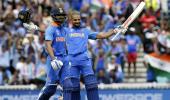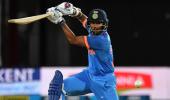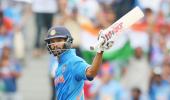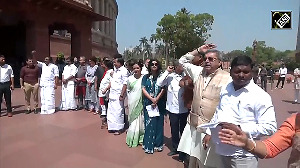'He never had a negative thought in his mind, he was supremely confident.'
'He always stuck to his natural game, he never moved away from that.'

Shikhar Dhawan, one of India's top batters in white ball cricket, announced his retirement from the sport on Saturday, August 25, 2024.
Dhawan's international career had an inauspicious start when he was dismissed for a duck in his first match, an ODI against Australia in 2010.
He made a remarkable comeback a couple of years later, smashing a stunning 187 on his Test debut against the same opponents in Mohali in 2013.
He reached an 85-ball century in that Test -- still the record for the fastest century by a debutant.
The 38 year old, who played for India from 2010 to 2022, scored 2,315 runs in 34 Tests at an average of 40. But, it was in the white ball formats where he truly made his mark.
Dhawan, who scored 6,793 runs in 167 ODIs at a strike rate of 91 was a master batter in the 50 overs format and played a big role in India's 2013 Champions Trophy triumph.
He was also the highest run-getter in the next edition in 2017, while also enjoying a superb run with the bat in the 2015 ODI World Cup.
In T20 cricket too he left a mark with 1,759 runs in 68 international games, while in his IPL career he tallied 6,769 runs in 222 games at a strike rate of 127, with 51 fifties and two centuries.
His childhood coach Madan Sharma was caught unawares by Dhawan's sudden retirement from the sport.
"I didn't imagine that he would retire so suddenly. With Shikhar, once he realised there were good young players ready to take his place he was happy to step aside," Sharma tells Rediff.com's Harish Kotian in an exclusive interview.
As the first coach, how do you look back at Dhawan's career and how proud are you of your ward?
I am happy too and at the same time little sad too, it is a mix of both.
The happiness is because he had a successful long career, but little bit dejected because as the coach you always want your ward to play more. I felt he could have played in the 2023 World Cup last year and maybe a couple of more IPLs.
A player never feels like stopping. If he is able to stay fit he wants to keep playing but Shikhar was not that type of a player.
He felt that a lot of young good players are coming through like Shubman Gill, Yashasvi Jaiswal and Ishan Kishan, so he thought it is better to quit gracefully and let the next generation take over.
One day every player has to retire, and he can now explore other avenues whether he stays connected to cricket or explore other opportunities.

Did he speak to you before announcing the retirement or after it?
He didn't speak to me about the retirement and I also didn't imagine that he would retire now so suddenly.
I spoke to him on Sunday morning, it was his own decision. He had consulted his family before taking the decision.
I spoke to his father also, he also said it was his own decision.
He had got injured during the IPL and at this age of 38 recovery and all takes time.
The main thing is if your mindset is clear that you want to retire and take up something else which you are planning then it becomes easy to take the decision.
So he was quite clear with his thinking, there was no back and forth, that his playing days are over.
There comes a time for everyone.
When he first came into the team he took the place of big players like Viru (Virender Sehwag) and Gautam (Gambhir).
With Shikhar, once he realised there were good young players ready to take his place he was happy to step aside. He has himself praised guys like Gill, Jaiswal, Ishan Kishan and wanted them to get chances.
For him, his thing was that whatever God has given, that is enough for me. He never showed greed in life in every aspect.
He is a very devotional guy, he prays a lot and he feels that whatever is written for him he is happy with it.
Dil se bhi Gabbar hai woh! (He has a big heart!)
Do you remember the first time you saw Shikhar Dhawan?
I met him for the first time when he was 12, I think it was the 1996-1997 season. We had our summer vacation camp at our Sonnet Club in Delhi. Rambabu Gupta, who was the international umpire then, brought Dhawan to our club.
When I saw him bat for the first time -- a young left-hander who was 12 he played some cracking shots.
The key thing was that he used to feel very bad whenever we lost a match, and that he should work harder for the team. So he was a hardworking player right from the start.
He had so much potential at that young age. You have some players who with minimum effort get maximum results.
He had some good shots like the cover drive, even then he used to slog sweep, he used to flick a long way even though he didn't have much control of the shot that time.
He had a very good flow as far as his batting was concerned and with more practice he gradually became technically sound.
He soon made it to the Delhi team and since then there has been no looking back. He was dropped once but after that he had made the place his own.
He went on to play for India U-19 Asia Cup, World Cup, followed by Ranji Trophy and then to the Indian team so he kept climbing the stairs of success one after another.
Shikhar had a superb attitude on the field, always positive and smiling.
When he used to play for our club (Sonnet Club in Delhi) that time too he used to enjoy himself.
Even when he was not feeling good about something, he still managed to smile and lift everyone up. When we used to lose a match, he used to punish himself too and say 'I should have won the match for my team'.
Even though he was hurting from inside, he always kept the atmosphere positive when he was with his team-mates inside the dressing room. He believed that you should enjoy the game and not feel the pressure else you will not succeed.

Shikhar worked a lot on his batting since making his India debut. His batting evolved a lot since 2013 as he managed to iron out a lot of flaws and score runs on a consistent basis.
Yes, he worked really hard on his batting. As a batter, nearly 70 to 80 percent of the balls you face will be outside the line of off stump, so you have to prepare accordingly. You will have bowlers who will keep bowling outside the off stump wanting you to play the cover drive so you get the edge while driving and get caught behind.
So this process of getting better is not a process for a day or week, it continues throughout your career.
You try a lot of things like playing with a plastic ball, or a wet ball, to learn how to counter swing before going to England or prepare for the bouncy tracks in Australia or South Africa. So he used to prepare very hard before each tour.
The best part about Shikhar is that he was mentally very strong. He used to give it all his during the practice sessions, replicate the match situations so he was always well prepared for a series.
Would you say he was one of the best openers India have had in white ball cricket?
He formed a lethal opening partnership with Rohit Sharma for a few years.
He was someone who did well in the big ICC tournament like the Champions Trophy in 2013 and also in 2017 and the ODI World Cup in 2015. He was someone who loved the big stage.
Yes, he was a very good batter in white ball cricket. As you said, the Champions Trophy which we won in 2013 and the next Champions Trophy in 2017 or the World Cup in 2015 and even in 2019 he did well with a century against Australia as he could play only two games due to injuries.
What made him so successful in big tournaments was that the fact that the overseas pitches which had some bounce and pace suited his style of batting. He loved the ball coming on to the bat.
I would say he did well in red ball cricket too right from the Under-17 level then Under-19 day and domestic cricket. Once you do well in red ball cricket, scoring centuries and double centuries, it gives you the confidence for white ball cricket as well that you can do well in any condition.
During his days I would say there were more white ball games then red ball so he might have played more limited over games.
But Shikhar was always clear in his mind that Test cricket is the number one format for him, he believed that to be rated as a top player you need to do well in Tests.
Shikhar made an amazing start to Test cricket, smashing the fastest century by a debutant, against Australia in Mohali in 2013.
When you look back at his career as a coach and maybe even for Shikhar, is there some regret that he ended up playing only 34 Tests?
I always used to think about this. I always believed that Shikhar should play atleast 70-80 Test matches in his career. He had so much potential in his batting. And even in white ball cricket I wanted him to play more than 200 ODIs matches.
But maybe in between injuries did hamper his career at times.
In the 2019 World Cup, he was ruled out with injury after playing two games. He was in good form then and had scored a century against Australia which India won but the injury came at the wrong time and he could not play any more games despite being in such good form.
I remember he hit a century in a Test against Sri Lanka in Galle (in the 2015 series) but again he got injured and missed the last two Tests when in form.
So injuries have definitely played a part somewhere else his record in all the countries is good except maybe England (in 2018). In that series except Virat Kohli no other Indian batters did well.

How has your relationship been with Shikhar all these years?
Back in those days we didn't have much money, we used to travel by auto or cab. I remember I had a scooter back then so me and Shikhar travelled in that, it was an old scooter but we both have travelled a lot for practice and matches. Those days we never used to think that we should buy a car and all, we only used to think about playing more matches and training.
I remember I used to spend from my pocket to help the kids, like ordering food for everyone or for other needs. We had a lot of boys at the club, we played in lot of other tournaments so we spent a lot of time together but Shikhar never complained.
With Shikhar, you knew from the start that this guy had it in him to succeed at the highest level. His temperament, his skill level, his dedication, it was clear from an early age that he could make it big.
Today when I look back I can't believe that 20-plus years have just flown past.
Even Shikhar keeps saying 'can't believe time flies so fast. It feels like yesterday that I came to you as a young kid and was batting in the nets, playing matches for the club, if we didn't do well you used to shout at us or praise us if we did well'.
It feels so good that he still remembers all those small small things from those days. If you go on to play on at such a big level, you forget the past but Shikhar is not like that, he treasures all those memories.
Even till recently, he used to come to our club whenever he wanted some practice.
How would you remember Shikhar Dhawan's legacy?
Taking Shikhar's example I tell the young kids at my academy 'Technique is important, planning is important but the most important thing is the mindset. You need to be mentally strong'.
Shikhar used to prepare in the nets very seriously and he was able to successfully replicate what he learnt in the nets in a match as well.
He never had a negative thought in his mind, he was supremely confident. He always stuck to his natural game, he never moved away from that.
I take his example to the kids that from this very club he has gone on to play for India. He worked very hard to reach where he did and that is what should inspire you as well.
Someone as passionate as Shikhar, do you want him to stay connected to cricket after his retirement?
Absolutely! I believe that if cricket has given you so much you should also give back to the game. There are so many things you can do like coaching or commentary or become a selector.
Shikhar will stay connected, I am sure. He has already started it by buying a team in the Delhi Premier League which has given opportunity to around 20 youngsters from Delhi.
He also runs a NGO to help the needy. So he is doing his bit for the game and the society as well.
I just wish him all the best in whatever endeavours he takes up.













 © 2025
© 2025